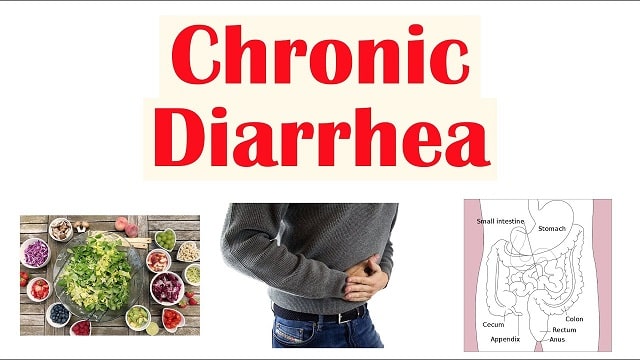Chronic Diarrhea
Chronic diarrhea is a disease characterized by prolonged diarrhea that can last more than 2 weeks. Diarrhea is a digestive disorder that causes sufferers to have bowel movements too often, with stools (feces) that are more runny than usual. Generally, people with diarrhea can experience loose bowel movements up to more than 3 times a day.
This condition should not be underestimated. Diarrhea that lasts for a long time or is chronic can be a sign of certain diseases. In fact, chronic diarrhea can be caused by several conditions. If left untreated, sufferers of this digestive disorder can experience complications or conditions that worsen diarrhea.
Symptoms of Chronic Diarrhea
The general symptoms of chronic diarrhea are almost the same as diarrhea in general, namely defecation with liquid or soft consistency, urge to defecate, and more than 3 times a day. However, diarrhea will generally heal within a few days and rarely causes dangerous conditions. While chronic diarrhea lasts longer and can trigger fatal impacts on body health.
In addition to frequent bowel movements with soft stools, this disease can also be accompanied by various other symptoms. Symptoms that accompany diarrhea depend on the underlying disease, such as
- Abdominal pain or cramps.
- Flatulence.
- Nauseous.
- There is mucus in the stool.
- There is blood in the stool, either in the form of fresh red blood, stool mixed with blood or black.
- Fever.
- Weight loss.
Causes of Chronic Diarrhea
As mentioned earlier, chronic diarrhea is a symptom of certain diseases. Some diseases that can cause chronic diarrhea symptoms are:
- Viral, bacterial, and parasitic infections.
- Side effects of drugs, such as antibiotics, especially macrolides, non-steroidal anti-inflammatory drugs, drugs containing magnesium salts, such as antacids, hypoglycemic drugs ( metformin, gliptins ), chemotherapy drugs, and laxatives.
- Disorders of nutrient absorption in the intestine, such as lactose intolerance, fructose, Celiac disease, digestive enzyme deficiency, and chronic pancreatitis.
- Malignant diseases, such as colon cancer, pancreatic cancer, and colon polyps
- Other digestive disorders, such as Irritable Bowel Syndrome (IBS), inflammatory bowel disease (ulcerative colitis, and Crohn’s disease)
- Certain post-surgeries, usually after abdominal surgery, such as gallbladder removal, can cause a large amount of bile to enter the large intestine, causing chronic diarrhea.
- Hormonal diseases, such as excess thyroid hormone (thyrotoxicosis) and diabetes mellitus.
Diagnosis of Chronic Diarrhea
The doctor will ask about medical history, previous medication consumption, then perform a physical examination and suggest several supporting examinations as needed to determine what is causing chronic diarrhea.
Supporting examinations for chronic diarrhea include:
- Stool examination, to detect the presence of bacteria or parasites that can trigger diarrhea.
- Blood tests, performed to see if there are diarrhea-causing bacteria in the blood.
- Scans, such as X-rays, MRIs, or CT scans. The goal is to see the condition of the inside of the abdomen.
- A colonoscopy is a test performed to detect abnormalities in the digestive tract. This examination can be performed to check the condition of the intestines or pancreas.
Chronic Diarrhea Prevention
Not all cases of chronic diarrhea can be prevented. However, there are several efforts to prevent chronic diarrhea caused by infectious diseases, certain types of drugs, or in people at high risk, namely:
- Wash your hands with soap and running water before preparing food and drinks, after going to the toilet, or visiting sick people.
- Wash fruits and vegetables before cooking and consuming them
- Drink clean and boiled water
- Discuss the side effects of medications that can cause chronic diarrhea with your doctor and ask for medication changes if necessary.
- Take probiotic supplements if necessary
- Cooking meat or fish until done
Chronic Diarrhea Treatment
Treatment for chronic diarrhea is aimed at treating the underlying disease and reducing the symptoms that arise. Anti-diarrheal drugs, such as loperamide, can be given in certain cases, but not in all cases of chronic diarrhea. Chronic diarrhea due to bacterial infection can be given antibiotics, while those caused by parasites are given antiparasitic drugs.
If the cause of chronic diarrhea turns out to be due to the use of certain drugs, then stopping the drugs can stop the diarrhea.
If chronic diarrhea is due to impaired nutrient absorption, then avoiding foods that can cause diarrhea will stop the diarrhea, such as people with lactose intolerance are advised to avoid dairy products that contain lactose, such as cow’s milk, cheese, and yogurt made from cow’s milk.
